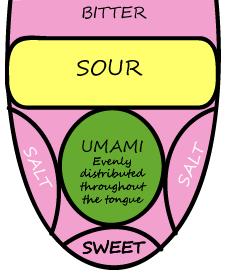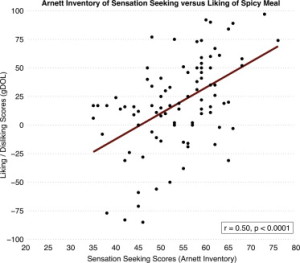While at my tailgate this weekend, I was eating buffalo chicken dip and commented how spicy I thought it was. My sister replied saying it wasn’t spicy enough. This made me wonder, why do we have different tolerances?
To start off, lets get science-y. Flavor is actually what people refer to as taste, according to Dr. Bruce Bryant of Monell Chemical Senses Center. Flavor is made up of three components: taste, olfactory sense, and trigeminal sense. Tastes that people sense are sweet, sour, salty, bitter, umami (see paragraph below to learn about umami), and even fattiness in some cases. Your olfactory senses work with tastes to produce the sensations people think are one-dimensional taste. For example: fruit will be either sweet or sour, but the “fruitiness” comes from your nose smelling your fruit, and your nose is what allows you to tell the difference between a peach and a pear, not your tongue. Your trigeminal system perceives spiciness awareness. Your trigeminal system detects pain through nerve endings sensitive to pain, temperature, and touch.
***Side note: I didn’t know what umami was so I checked it out. It is Japanese and is known as a pleasant savory taste. Umami is subtle and blends with other foods to “round out” the taste. Because of this, most people don’t recognize it but it enhances the taste of many foods. It is known as the fifth primary taste rather than the four tastes people thought existed (sweet, sour, salty, bitter).
With your trigeminal system, scientists think that some people are simply born with pain receptors less sensitive, but they lack research to back this up. Researchers DO know that exposing children to more spicy food’s at a young age can desensitize nerve endings, making them more tolerable to spicy foods. For example, Mexican parents give children packets of sugar with red chili powder, which builds up their spice tolerance. This causes the nerve endings in the mouth to die off, therefore allowing a high tolerance to spicy foods from a lack of nerve endings.
But what if you weren’t fed spicy foods as a child? How do these people have different tolerances? PENN STATERS (woohoo) did research to find a link between personality traits and a passion for spicy food. Scientists have found that personality is a factor for whether or not people like spicy foods and how often one eats spicy food. Researchers Nadia Byrnes and John Hayes from Penn State’s College of Agricultural Sciences found data that “suggests chili liking is not merely a case of increased tolerance with repeated exposure, but rather that there is an affective shift towards a preference for oral burn that is not found in chili dislikers”. This means some people just prefer an oral burn over other people. UPenn researchers had earlier linked chili liking to thrill seeking, and SUNY Stony Brook researchers found a relationship between chili liking and sensation seeking to be a more formal measure of personality. Both UPenn and SUNY Stony Brook’s studies were found to be very week, with neither study looking at intake.
In the PSU study, they used updated measure of sensation seeking questions that avoided gender and age based questions. They also used a four-point scale rather than a simple yes/no scale to be more precise. The PSU study consisted of 97 males and females ranging in age from 18 to 45 who filled out a food-liking questionnaire. On the questionnaire, participants rated the intensity of different taste sensations after sampling six things including capsaicin (the active component of chili peppers, and the spice used in the study) with water. Later, they took a survey including personality questions, as well as were asked how often they consume chili peppers. Overall, this study confirmed that liking or disliking spicy foods is not only determined by one’s sensitivity to capsaicin but that personality factors do exist and influence the affective response to the initial “burning” of capsaicin. The study also concludes that there were significant positive associations found between sensation seeking and the liking of spicy meals, though some relationships varied in strength.

Yearly Chili Intake vs. Arnett Inventory of Sensation Seeking
While I am only a college student taking a science course for non-science majors and realize the people who conducted their study are much more advanced in the science field, I wonder if this study could have been done better. The study only used 97 males and females, and more people would have helped support stronger findings to ensure it was less likely to be chance (Although Andrew taught us there is always a chance of chanceJ). I also wonder if there could be reverse causation, like if liking spicy foods could cause different personality traits. There could also be other potential confounding variables. To my knowledge, reverse causation and confounding variables were not discussed in the study, and I am curious if either of these affected the results of the study.
Overall, the study and other articles claim that personality factors do influence the affective response to the initial “burning” sensation from capsaicin. I do have some doubt with this because of the possibility of reverse causation and confounding variables and the lack of other similar studies.



I really loved this one, especially because I am a girl who loves spicy food so much. Have you put into thought that maybe as a third factor that as toddlers and growing up your sister was fed more spicy foods, developing an immunity which you don’t have, allowing her to eat these spicier plates.
I found your blog to be really interesting and eye catching when it comes to me paying attention to how my taste buds react to certain foods. With all the questions that you answered throughout your blog, I am curious if texture and temperature can have an effect in tolerance. For example, could you react different to eating a hot and spicy soup compared to spicy buffalo chicken wings? I feel like this can make sense especially when comparing the reaction to really hot food and really cold foods.
I have never been one for spicy food, I’m not sure if that’s because I never gained a tolerance to it or maybe my personality isn’t “spicy” enough. I have found quite a lengthy and detailed analysis drawing parallels betweens spider toxins and the mechanisms in plants (capsaicin) that deter predators. This can explain why peppers and other plants are so hot and why some people might not enjoy them: they’re not meant to be eaten. That link is here: http://www.nature.com/nature/journal/v444/n7116/full/nature05285.html. However, I do understand that people enjoy the thrill of trying spicy things because according to the following article, we are the only mammals that do..http://gizmodo.com/5645331/why-do-humans-love-spicy-self-torture
I found your blog to be one of the most interesting I have read so far because this was truly a question I have always wondered. Why do some people like spicy food while others cannot handle it? I always assumed that it had to do with a person’d background and the food they were brought up on. While I find Indian food to be spicy, my Indian friends do not. (If I eat anything with the least bit of spiciness I automatically start tearing up.) I used to explain this because of my culture’s (Egyptian) food being predominately sweet; I love sweets. After researching I found that there are ways to build tolerance. Start with small amounts of spiciness and as soon as you adapt to that higher the level of spiciness. This will increase your tolerance for spicy foods.